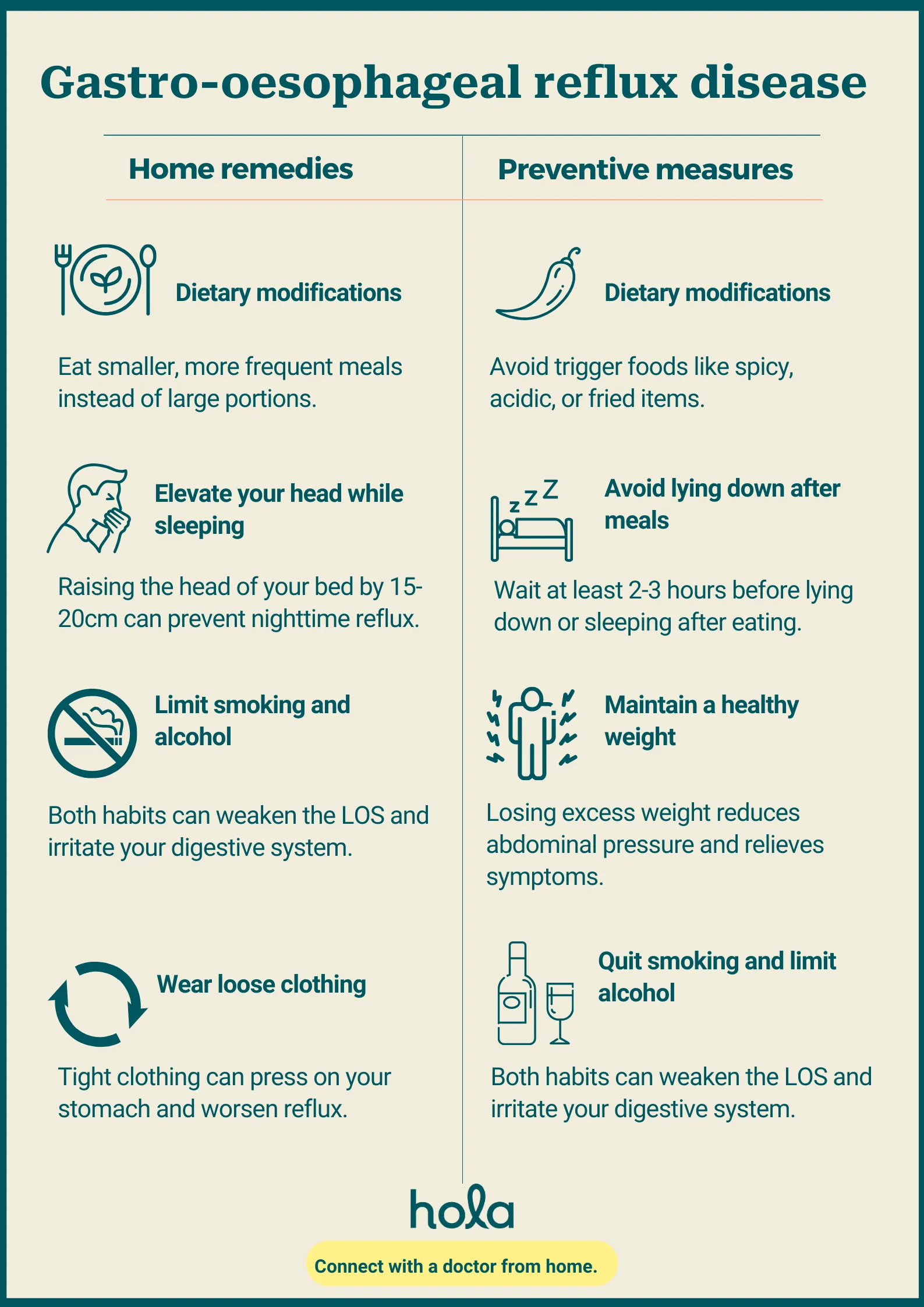Understanding gastro-oesophageal reflux disease
Written by Dr Nelson Lau, MBBS FRACGP, GP & Digital Health Specialist.Originally published on 19 December 2024. Blog updated on 19 September, 2025.

Contents

Overview
Gastro-Oesophageal Reflux Disease (GORD) is one of the most common digestive issues in Australia. It can often affect your sleep, work, and your general daily comfort. Getting occasional bouts of reflux is normal, but GORD that persists in the longer term can seriously impact health and quality of life. Many Aussies don't realise just how much reflux can creep into their daily routine until it starts disturbing their sleep or making eating meals uncomfortable.
What is gastro-oesophageal reflux disease?
GORD occurs when stomach acid frequently flows back into the oesophagus (the tube connecting your mouth to your stomach). This backflow, known as acid reflux, irritates the lining of the oesophagus, leading to uncomfortable symptoms such as heartburn and regurgitation. While occasional reflux is normal, persistent symptoms indicate GORD, a condition that may require medical attention.
Symptoms of GORD?
GORD symptoms vary in intensity but typically include:
- Heartburn: A burning sensation in the chest that often worsens after eating or lying down.
- Regurgitation: A sour or bitter-tasting fluid backing up into your throat or mouth.
- Difficulty swallowing (Dysphagia): A feeling of food sticking in your throat.
- Chest pain: Often mistaken for a heart attack, this pain is caused by oesophageal irritation.
- Chronic cough or hoarseness: Irritation from acid reflux can impact your throat and vocal cords.
- Nausea: Especially after meals.
Causes and risk factors
- Weak lower oesophageal sphincter (LOS): This is the valve between the stomach and oesophagus that acts to stop acid from rising back up, but when it's weak and doesn't close properly, it allows stomach acid to reflux.
- Obesity: The extra abdominal weight creates added pressure on the stomach and can trigger reflux.
- Smoking and alcohol: Both relax the LOS and make acid reflux more likely.
- Pregnancy: Hormonal changes from pregnancy, as well as pressure on the stomach from the growing foetus, increase the risk of GORD
- Certain foods and drinks: Spicy, fatty foods, coffee, and fizzy drinks are all common triggers of GORD
- Medications: Some painkillers and blood pressure medicines can tend to worsen reflux.
It's often a mix of these triggers rather than just one cause, which can make it tricky to pin down without keeping track of your symptoms.
Complications if left untreated
- Oesophagitis: This is when the lining of your oesophagus becomes inflamed due to ongoing exposure to the stomach acid.
- Narrowing (stricture): Scar tissue develops around the oesophagus and can cause difficulties with swallowing.
- Barrett's oesophagus: Long-term acid damage increases the risk of cancer.
- Sleep disturbance: Lack of adequate sleep and rest worsens tiredness and productivity.
So early management must be started so that it can help to reduce these risk factors and improve long-term outcomes. It's always better to get on top of reflux early rather than waiting until it starts interfering with your lifestyle in bigger ways.
Treatment options for adults
- Lifestyle modifications: Lose weight, eat smaller meals, quit smoking, and cut back on alcohol.
- Over-the-counter medicines: Antacids and acid suppressants can provide short-term relief.
- Prescription medicines: Proton Pump Inhibitors (PPIs) or H2 blockers both help to relieve the symptoms by reducing acid production.
- Surgery (rare cases): This option is considered if medication and lifestyle changes haven't been successful and symptoms are still severe.
Most people find that simple changes make a big difference, but it's reassuring to know stronger options are available if you need them.
Lifestyle modifications
- Avoid eating late at night and lying down straight after eating, as this makes it easier for acid to reflux
- Raising your bed head helps to reduce nighttime symptoms by making it more difficult for acid to reflux back up, thanks to gravity.
- Try swapping coffee and fizzy drinks for water or herbal teas.
- If possible, it's preferable to eat smaller, more frequent meals.
These tweaks might feel small at first, but they can add up to a noticeable difference in how often reflux bothers you.
Experiencing these symptoms? Speak with a doctor within 15 minutes.
Diagnosis and tests
If you suspect GORD, it's essential to consult a doctor for an accurate diagnosis. Common tests include:
- Endoscopy: A thin, flexible tube with a camera is used to examine the oesophagus and stomach for damage.
- pH monitoring: A device measures the amount of acid in your oesophagus over 24 hours.
- Oesophageal manometry: This test assesses the strength and coordination of your oesophageal muscles.
- Barium swallow X-ray: You'll drink a special liquid while X-rays capture images of your upper digestive tract.
Managing GORD day-to-day in Australia
- At work: Keep healthy snacks on hand and avoid rushing to finish your meals. Try to stay upright after having your lunch and let gravity help you to keep the acid in your stomach.
- During travel: Pack reflux-friendly snacks. Try to avoid alcohol on flights and request lighter meals.
- At night: Sleep slightly elevated and avoid heavy dinners.
- Support: Telehealth consults are available for ongoing management of your GORD. Discuss with your doctor, as they can also provide medical certificates if your GORD symptoms affect your work or study.
The key is consistency — a few mindful choices each day can really lighten the load of living with GORD.
Home remedies, treatments, and prevention

While medical treatment is crucial for severe cases, you can make lifestyle changes to manage and prevent GORD:
Dietary modifications
- Avoid trigger foods like spicy, acidic, or fried items.
- Eat smaller, more frequent meals instead of large portions.
Elevate your head while sleeping
- Raising the head of your bed by 15-20cm can prevent nighttime reflux.
Avoid lying down after meals:
- Wait at least 2-3 hours before lying down or sleeping after eating.
Maintain a healthy weight
- Losing excess weight reduces abdominal pressure and relieves symptoms.
Quit smoking and limit alcohol
- Both habits can weaken the LOS and irritate your digestive system.
Wear loose clothing
- Tight clothing can press on your stomach and worsen reflux.
Occasional Reflux vs Chronic GORD
- Occasional reflux: As the term suggests, this is not something that is ongoing and can happen to many of us after having had a heavy meal or certain foods, but the symptoms usually settle down quickly.
- Chronic GORD: The symptoms usually occur at least twice a week and can interfere with your sleep, work, or your general well-being.
If you notice that it's becoming a regular issue rather than the odd flare-up, that's usually the red flag to check in with your doctor.
When to consult a doctor?
You should seek medical attention if:
- You experience severe or frequent heartburn (more than twice a week).
- Over-the-counter medications provide little relief.
- Symptoms such as difficulty swallowing, unexplained weight loss, or persistent vomiting occur.
- You have chest pain that may be mistaken for a heart attack.
Timely diagnosis and treatment can prevent complications and improve your quality of life.
How can an Hola Health doctor help via telehealth?
Telehealth consultations provide a convenient way to manage GORD.
Online doctors can assist with:
- Assess your symptoms and recommend over-the-counter or prescription medications.
- Advise on lifestyle changes tailored to your needs.
- Arrange referrals for diagnostic tests if necessary.
- Provide ongoing support and monitor your progress without requiring in-person visits.
With telehealth, you can get expert advice from the comfort of your home, making it a practical option for busy schedules:-
- Instant scripts: If treatment is needed, your doctor can provide prescriptions electronically, which are available for collection at a local pharmacy or through an online service with medicine delivery options.
- Medical certificates online: If the condition requires you to take time off work or manage gastro symptoms at home, Hola's online doctor service can provide a medical certificate for your needs.
Conclusion
Gastro-oesophageal reflux disease can be a persistent nuisance, but it's manageable with the right approach. By understanding the causes, symptoms, and treatment options, you can take control of your digestive health. Don't hesitate to seek professional help if symptoms persist—early intervention is key to preventing complications. Whether it's through lifestyle adjustments, medical treatment, or telehealth consultations, relief is within reach.
FAQs
What foods should I avoid if I have GORD?
Foods that are spicy, fatty, and fried can often trigger reflux. Coffee, chocolate, citrus, and fizzy drinks are also common triggers.
Is GORD the same as acid reflux?
Not exactly. Acid reflux is the occasional backflow of stomach acid, while GORD is the chronic, frequent form of this condition that requires medical attention.
Can GORD go away on its own?
Sometimes. If you catch it early and manage it well. But if you've been dealing with it frequently, it's unlikely to "go away on its own.
How serious is GORD if untreated?
Most people will never get to the cancer-risk stage, but it can cause damage to the oesophagus, narrowing it and increasing the risk of oesophageal cancer. It can also affect your sleep and productivity.
What's the difference between GORD and GERD?
They're the same thing – "GORD" is used in Australia and the UK, while "GERD" is the American term because we spell it as oesophagus, while the US spelling is esophagus.
Can stress make GORD worse?
Definitely, stress doesn't cause GORD directly, but it can worsen it by increasing stomach acid. Anxiety and tight schedules can make GORD worse, so relaxation techniques may sometimes help. It's a reminder that looking after your mental health can also support your physical health.
How is GORD diagnosed in Australia?
GPs often diagnose based on symptoms. Tests such as breath testing (to test for the bacteria H.Pylori) and endoscopies (a telescopic camera looking into your oesophagus and stomach) are used if symptoms are severe or unclear.
Can I get GORD medication online in Australia?
Yes. Through telehealth consultations, GPs can prescribe medicines like PPIs for you. It can save you a trip to the clinic, especially if symptoms flare up while you're busy with work or family.
How to reduce your risk of gastro-oesophageal reflux disease
Preventing GORD starts with making smart lifestyle choices:
- Adopt a balanced diet: Incorporate whole grains, lean proteins, fruits, and vegetables.
- Stay active: Regular exercise helps maintain a healthy weight and supports digestion.
- Minimise stress: Chronic stress can exacerbate reflux; consider relaxation techniques like yoga or meditation.
- Avoid trigger foods and habits: Learn your specific triggers and modify your diet accordingly.
15 minutes, anytime, anywhere.
What we treat
- Cough
- Nausea & vomiting
- Fever
- Hayfever
- Fatigue
- Sore throat
- Acne
- Hair loss
- Gout
- Eczema
- Rosacea
- Sunburn
- UTI
- Erectile dysfunction
- Contraception
- Morning sickness
- Morning after pill
- Prostate health
- Anxiety
- Depression
- Stress
- Grief & loss
- Antidepressants
- Premature ejaculation
- Asthma
- Blood pressure
- Blood thinners
- Diabetes
- Cholesterol
- Migraines & headaches
- Allergies
- Body ache
- Heartburn & reflux
- Sleep disorder
- Pain relief
- Gastro
Related Articles
Disclaimer
This blog is for general informational purposes only and does not indicate that Hola Health provides all treatments or preventive measures mentioned. It is not intended to be a substitute for professional medical advice. Always seek the guidance of your doctor or other qualified health professional with any questions you may have regarding your health or a medical condition. For emergencies please immediately contact 000. Any medical topics discussed are intended to educate, not to imply availability through Hola Health.
 Facebook
Facebook  X
X  Copy Link
Copy Link



